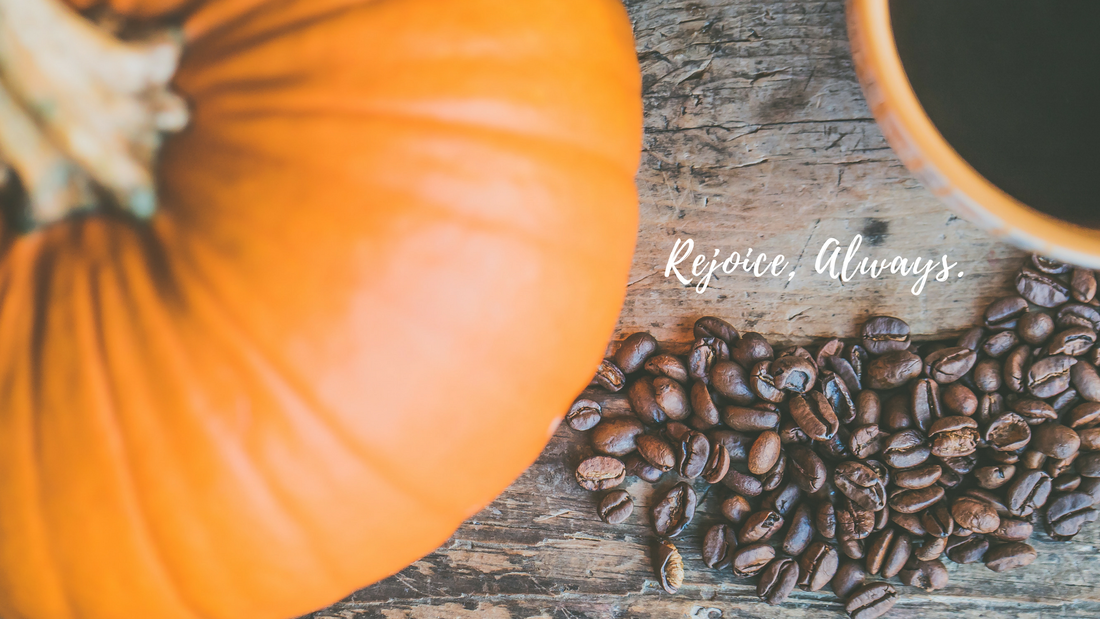|
"Rejoice in the Lord always. I will say it again: Rejoice!" - Philippians 4:4 Paul's message to the Philippians here is really rather straightforward: Rejoice! Don’t be anxious. Rejoice and give thanks. Meditate on the good things of God and find peace in His glory. That’s really it. But what happens when it's not that easy? The reality is that life can bring all sorts of circumstances that crowd out our rejoicing. Some of us give in to that despair. Others try to fake it and put on a happy face to bear through it. But I don't think that Paul here is talking about either of those options. He is instead encouraging followers of Jesus to practice joy. Happiness is dependent upon our circumstances, but joy is rooted in the hope and promise of God's goodness. Happiness can be fleeting. Joy can endure into even the darkest situations if we hold fast to hope. So how do we practice joy? WHAT IS YOUR BODY TELLING YOURSELF? There’s a social psychologist named Amy Cuddy who has found that practicing certain postures can actually reshape our mental dispositions (check out her Ted Talk here). For example, people who practice power poses experience a rise in testosterone and a dip in their cortisol. Testosterone is tied to confidence and risk-taking, while cortisol affects how intensely we react to stress. So simply practicing power poses for a short while can boost your confidence and make you more relaxed when stressors come up. Conversely, “weaker” postures showed a dip in testosterone and a spike in cortisol, making those people less willing to speak up and more likely to panic under stress. We know that our non-verbals shape the way that others think about us. But our non-verbals actually also influence how we think about ourselves. And how we think period. Changing your posture can literally change how you think and respond to the world. Rejoicing always doesn't mean that we should try to feel happy all the time. It means living a life that physically expresses and reminds us of the hope that lies within us. The joy of Christ’s salvation, His lordship, and the hope in the day that He will return to put all things right again. The question, then, is what do your habits and posture tell yourself? Do you believe that God is good? Does your body show it? POSTURES FOR WORSHIP Most conversations that I have heard about worship postures search the bible for evidence about what is acceptable, encouraged, or commanded for worship. Rather than give detailed commands, however, the Bible describes a variety of physical responses to communicate awe and reverence. Here is just a short sampling: The scripture examples pulled here are meant for demonstration only, and this is nowhere close to an exhaustive list. I will note that there’s surprisingly little biblical description or mandate for standing in worship. This was surprising to me since it's been the assumed proper posture in worship for most churches I have attended. There’s even less evidence for sitting. There are some brief mentions of sitting in a quiet place, but this is more in the context of private prayer. But the bigger picture is that the people of God are invited to praise and worship with all that we are - mind AND body, words AND posture, inward reflection AND outward expression. Standing, lifting hands, clapping, and even dancing are all simple and natural expressions of excitement and joy. We ought to feel free to express ourselves in all of these ways! But what about our more reverent moods? We have postures for that as well! Bowing down and laying prostrate before God in worship are some of the most common biblical responses to God's holiness and grandeur. Ironically, many congregations that pride themselves on biblical literalism seldom practice either. They are uncomfortable and somewhat embarrassing because it makes us vulnerable. Yet there is a great freedom and joy that comes from expressing our surrender before God in this way.
OK, so the bull one is intentionally silly. The OT sacrificial system worship did involve giving of animal sacrifice as an act of thanksgiving, but we obviously do not practice that anymore. The heart behind the action is important, however. It was the active giving over of the best of your resources as an offering of praise and gratitude for God’s provision. We do that now through the giving of our finances and donations of physical resources. Bringing it back to the big picture: the act of humbling ourselves before God and giving of our resources and talents communicates honor and surrender. It reminds us that we are not in control, and that is OK. More than OK, it's GOOD! SO WHAT? My hope is that this quick overview can give you a sense of greater freedom of expression before God in worship. Ultimately, our forms of worship are just that - forms. They are only "right" or "wrong" inasmuch as they lead us into a greater knowledge and adoration of God as revealed in the person of Jesus Christ. So sit, dance, sing, lift your hands, bow down in humility, or jump and shout for joy. Just do it for the Lord. Cause that's all that's really asked of you. "Rejoice in the Lord always. I will say it again: Rejoice!" - Philippians 4:4 Being a pastor doesn't make you immune to temptations of a busy life. Particularly around the holidays, it can be easy to get so swept up in family plans and events that we fail to fully stop and appreciate what God is doing in the midst of it all.
As I have been reflecting on worship and gratitude the last two weeks, I was reminded of a song I wrote years ago. I shared it in our message on Sunday, and I thought I'd share it with you all today as a reflection for Thanksgiving. It was a sort of honest prayer and reflection in a time that I wished I'd had something more and better to give. The lyrics are as follows: I do not have time to spend with You I've got far too much to do today I do not know how much You are worth I spend all my time on useless things See! The Flower and trees, they sing for You My heart should be trained to do the same But I have not song, nor speech, nor praise I spend all my time on useless things Teach me how to seek Your face again To recognize Your voice and know Your name I am slow to love and quick to sin You are full of hope and righteousness Teach me how to look like You Teach me how to love like You Teach me how to live like You Teach me how to live... My prayer this Thanksgiving is that we might be a little less busy, a little more present, and a little more alive in the glory of God's grace and goodness. May we lay aside all the useless things that beg for our attention and be fully present and thankful. Happy Thanksgiving everyone! Welcome to the GFBC Family blog! This is the first post on our brand new website. In the future this blog may be used to post special congregational updates, recaps of events, testimonies and devotionals, and helpful resources from me - Cory - the lead pastor here at First Brethren.
In the meantime, I just want to say hello and welcome. It's been a pleasure for Lydia and I to get to know folks here at GFBC after starting here in October, and we're excited for what God has in store for our future together! |
GFBC FamilyUpdates and devotional thoughts for and from our faith family. Archives
August 2018
Categories |




 RSS Feed
RSS Feed